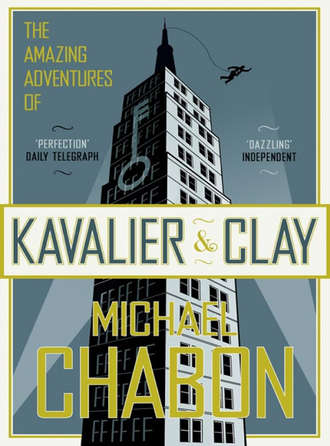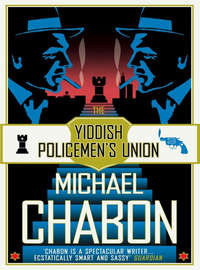
Полная версия
The Amazing Adventures of Kavalier and Clay
“What’s that?” Thomas said, when Josef returned to the parlor with one of Hora’s extra-large garment bags slung over his shoulder. “What happened? What’s wrong?”
“Nothing,” said Josef. “Look, Thomas, I have to go. I’m sorry.”
“I know.” Thomas sounded almost irritated. He sat down cross-legged on the floor. “I’m going to spend the night.”
“No, Thomas, I don’t think—”
“You don’t get to say,” Thomas said. “You aren’t here anymore, remember?”
The words echoed Kornblum’s sound advice, but somehow they chilled Josef. He could not shake the feeling—reportedly common among ghosts—that it was not he but those he haunted whose lives were devoid of matter, sense, future.
“Perhaps you’re right,” he said after a moment. “You oughtn’t to be out in the streets at night, anyway. It’s too dangerous.”
A hand on each of Thomas’s shoulders, Josef steered his brother back to the room they had shared for the last eleven years. With some blankets and a slipless pillow that he found in a trunk, he made up a bed on the floor. Then he dug around in some other crates until he found an old children’s alarm clock, a bear’s face eared with a pair of brass bells, which he wound and set for five-thirty.
“You have to be back there by six,” he said, “or they’ll miss you.”
Thomas nodded and climbed between the blankets of the makeshift bed. “I wish I could go with you,” he said.
“I know,” Josef said. He brushed the hair from Thomas’s forehead. “So do I. But you’ll be joining me soon enough.”
“Do you promise?”
“I will make sure of it,” Josef said. “I won’t rest until I’m meeting your ship in the harbor of New York City.”
“On that island they have,” Thomas said, his eyelids fluttering. “With the Statue of Liberation.”
“I promise,” Josef said.
“Swear.”
“I swear.”
“Swear by the River Styx.”
“I swear it,” Josef said, “by the River Styx.”
Then he leaned down and, to the surprise of both of them, kissed his brother on the lips. It was the first such kiss between them since the younger had been an infant and the elder a doting boy in knee pants.
“Goodbye, Josef,” said Thomas.
When Josef returned to Nicholasgasse, he found that Kornblum had, with typical resourcefulness, solved the problem of the Golem’s extrication. Into the thin panel of gypsum that had been used to fill the door frame at the time when the Golem was installed, Kornblum, employing some unspeakable implement of the mortuary trade, had cut a rectangle, at floor level, just large enough to accommodate the casket end-on. The obverse of the gypsum panel, out in the hall, was covered in the faded Jugendstil paper, a pattern of tall interlocking poppies, that decorated all the hallways of the building. Kornblum had been careful to cut through this thin outer hide on only three of his rectangle’s four sides, leaving at its top a hinge of intact wallpaper. Thus he had formed a serviceable trapdoor.
“What if someone notices?” Josef said after he had finished inspecting Kornblum’s work.
This gave rise to another of Kornblum’s impromptu and slightly cynical maxims. “People notice only what you tell them to notice,” he said. “And then only if you remind them.”
They dressed the Golem in the suit that had belonged to the giant Alois Hora. This was hard work, as the Golem was relatively inflexible. It was not as rigid as one might have imagined, given its nature and composition. Its cold clay flesh seemed to give slightly under the pressure of fingertips, and a narrow range of motion, perhaps the faintest memory of play, inhered in the elbow of the right arm, the arm it would have used, as the legend records, to touch the mezuzah on its maker’s doorway every evening when it returned from its labors, bringing its Scripture-kissed fingers to its lips. The Golem’s knees and ankles, however, were more or less petrified. Furthermore, its hands and feet were poorly proportioned, as is often the case with the work of amateur artists, and much too large for its body. The enormous feet got snagged in the trouser legs, so that getting the pants on was particularly difficult. Finally, Josef had to reach into the coffin and grasp the Golem around the waist, elevating its lower body several inches, before Kornblum could tug the trousers over the feet, up the legs, and around the Golem’s rather sizable buttocks. They had decided not to bother with underwear, but for the sake of anatomical verisimilitude—in a display of the thoroughness that had characterized his career on the stage—Kornblum tore one of the old tallises in two (kissing it first), gave a series of twists to one of the halves, and tucked the resulting artifact up between the Golem’s legs, into the crotch, where there was only a smooth void of clay.
“Maybe it was supposed to be a female,” Josef suggested as he watched Kornblum zip the Golem’s fly.
“Not even the Maharal could make a woman out of clay,” Kornblum said. “For that you need a rib.” He stood back, considering the Golem. He gave a tug on one lapel of the jacket and smoothed the billowing pleats of the trousers front. “This is a very nice suit.”
It was one of the last Alois Hora had taken delivery of before his death, when his body had been wasted by Marfan’s syndrome, and thus a perfect fit for the Golem, which was not so large as the Mountain in his prime. Of excellent English worsted, gray and tan, shot with a burgundy thread, it easily could have been subdivided into a suit for Josef and another for Kornblum, with enough left over, as the magician remarked, for a waistcoat apiece. The shirt was of fine white twill, with mother-of-pearl buttons, and the necktie of burgundy silk, with an embossed pattern of cabbage roses, slightly flamboyant, as Hora had liked his ties. There were no shoes—Josef had forgotten to search for a pair, and in any case none would have been large enough—but if the lower regions of the casket’s interior were ever inspected, the trick would fail anyway, shoes or no.
Once it was dressed, its cheeks rouged, its smooth head bewigged, its forehead and eyelids fitted with the tiny eyebrow and eyelash hairpieces employed by gentile morticians in the case of facial burning or certain depilatory diseases, the Golem looked, with its dull grayish complexion the color of boiled mutton, indisputably dead and passably human. There was only the faintest trace of the human handprint on its forehead, from which, centuries before, the name of God had been rubbed away. Now they only had to slide it through the trapdoor and follow it out of the room.
This proved easy enough; as Josef had remarked when he lifted it to get the trousers on, the Golem weighed far less than its bulk and nature would have suggested. To Josef, it felt as if they were struggling, down the hallway, down the stairs, and out the front door of Nicholasgasse 26, with a substantial pine box and a large suit of clothes, and little besides.
“‘Mach’ bida lo nafsho,’” Kornblum said, quoting Midrash, when Josef remarked on the lightness of their load. “‘His soul is a burden unto him.’ This is nothing, this.” He nodded toward the lid of the coffin. “Just an empty jar. If you were not in there, I would have been obliged to weight it down with sandbags.”
The trip out of the building and back to the mortuary in the borrowed Skoda hearse—Kornblum had learned to drive in 1908, he said, taught by Franz Hofzinser’s great pupil Hans Kreutzler—came off without incident or an encounter with the authorities. The only person who saw them carrying the coffin out of the building, an insomniac out-of-work engineer named Pilzen, was told that old Mr. Lazarus in 42 had finally died after a long illness. When Mrs. Pilzen came by the flat the next afternoon with a plate of egg cookies in hand, she found a wizened old gentleman and three charming if somewhat improper women in black kimonos, sitting on low stools, with torn ribbons pinned to their clothes and the mirrors covered, a set of conditions that proved bemusing to the clientele of Madame Willi’s establishment over the next seven days, some of whom were unnerved and some excited by the blasphemy of making love in a house of the dead.
Seventeen hours after he climbed into the coffin to lie with the empty vessel that once had been animate with the condensed hopes of Jewish Prague, Josef’s train approached the town of Oshmyany, on the border between Poland and Lithuania. The two national railway systems employed different gauges of track, and there was to be a sixty-minute delay as passengers and freight were shifted from the gleaming black Soviet-built express of Polish subjugation to the huffing, Czarist-era local of a tenuous Baltic liberty. The big Iosef Stalin–class locomotive eased all but silently into its berth and uttered a surprisingly sensitive, even rueful, sigh. Slowly, for the most part, as if unwilling to draw attention to themselves by an untoward display of eagerness or nerves, the passengers, a good many young men of an age with Josef Kavalier, dressed in the belted coats, knickers, and broad hats of Chasidim, stepped down onto the platform and moved in an orderly way toward the emigration and customs officers who waited, along with a representative of the local Gestapo bureau, in a room overheated by a roaring pot-bellied stove. The railway porters, a sad crew of spavined old men and weaklings, few of whom looked capable of carrying a hatbox, let alone the coffin of a giant, rolled back the doors of the car in which the Golem and its stowaway companion rode, and squinted doubtfully at the burden they were now expected to unload and carry twenty-five meters to a waiting Lithuanian boxcar.
Inside the coffin, Josef lay insensible. He had fainted with an excruciating, at times almost pleasurable, slowness over a period of some eight or ten hours, as the rocking of the train, the lack of oxygen, the deficit of sleep and surfeit of nervous upset he had accumulated over the past week, the diminished circulation of his blood, and a strange, soporific emanation from the Golem itself that seemed connected to its high-summer, rank-river smell, all conspired to overcome the severe pain in his hips and back, the cramping of his leg and arm muscles, the near-impossibility of urination, the tingling, at times almost jolting, numbness of his legs and feet, the growling of his stomach, and the dread, wonder, and uncertainty of the voyage on which he had embarked. When they took the coffin from the train, he did not waken, though his dream took on an urgent but inconclusive tinge of peril. He did not come to his senses until a beautiful jet of cold fir-green air singed his nostrils, lighting his slumber with an intensity matched only by the pale shaft of sunlight that penetrated his prison when the “inspection panel” was abruptly thrown open.
Once more it was Kornblum’s instruction that saved Josef from losing everything in the first instant. In the first dazzling panic that followed the opening of the panel, when Josef wanted to cry out in pain, rapture, and fear, the word “Oshmyany” seemed to lie cold and rational between his fingers, like a pick that was going, in the end, to free him. Kornblum, whose encyclopedic knowledge of the railroads of this part of Europe was in a few short years to receive a dreadful appendix, had coached him thoroughly, as they worked to gaff the coffin, on the stages and particulars of his journey. He felt the jostle of men’s arms, the sway of their hips as they carried the coffin, and this, together with the odor of northern forest and a susurrant snippet of Polish, resolved at the last possible instant into a consciousness of where he was and what must be happening to him. The porters themselves had opened the coffin as they carried it from the Polish train to the Lithuanian. He could hear, and vaguely understand, that they were marveling both at the deadness and giantness of their charge. Then Josef’s teeth came together with a sharp porcelain chiming as the coffin was dropped. Josef kept silent and prayed that the impact didn’t pop the gaffed nails and send him tumbling out. He hoped that he had been thrown thus into the new boxcar, but feared that it was only impact with the station floor that had filled his mouth with blood from his bitten tongue. The light shrank and winked out, and he exhaled, safe in the airless, eternal dark; then the light blazed again.
“What is this? Who is this?” said a German voice.
“A giant, Herr Lieutenant. A dead giant.”
“A dead Lithuanian giant.” Josef heard a rattle of paper. The German officer was leafing through the sheaf of forged documents that Kornblum had affixed to the outside of the coffin. “Named Kervelis Hailonidas. Died in Prague the night before last. Ugly bastard.”
“Giants are always ugly, Lieutenant,” said one of the porters in German. There was general agreement from the other porters, with some supporting cases offered into evidence.
“Great God,” said the German officer, “but it’s a crime to bury a suit like that in a dirty old hole in the ground. Here, you. Get a crowbar. Open that coffin.”
Kornblum had provided Josef with an empty Mosel bottle, into which he was, at rare intervals, to insert the tip of his penis and, sparingly, relieve his bladder. But there was no time to maneuver it into place as the porters began to kick and scrape at the seams of the giant coffin. The inseam of Josef’s trousers burned and then went instantly cold.
“There is no crowbar, Herr Lieutenant,” one of the porters said. “We will chop it open with an ax.”
Josef struggled against a wild panic that scratched like an animal at his rib cage.
“Ah, no,” the German officer said with a laugh. “Forget it. I’m tall, all right, but I’m not that tall.” After a moment, the darkness of the coffin was restored. “Carry on, men.”
There was a pause, and then, with a jerk, Josef and the Golem were lifted again.
“And he’s ugly, too,” said one of the men, in a voice just audible to Josef, “but he’s not that ugly.”
Some twenty-seven hours later, Josef staggered, dazed, blinking, limping, bent, asphyxiated, and smelling of stale urine, into the sun-tattered grayness of an autumn morning in Lithuania. He watched from behind a soot-blackened pillar of the Vilna station as the two dour-looking confederates of the secret circle claimed the curious, giant coffin from Prague. Then he hobbled around to the house of Kornblum’s brother-in-law, on Pylimo Street, where he was received kindly with food, a hot bath, and a narrow cot in the kitchen. It was while staying here, trying to arrange for passage to New York out of Priekule, that he first heard of a Dutch consul in Kovno who was madly issuing visas to Curaçao, in league with a Japanese official who would grant rights of transit via the Empire of Japan to any Jew bound for the Dutch colony. Two days later he was on the Trans-Siberian Express; a week later he reached Vladivostok, and thence sailed for Kobe. From Kobe he shipped to San Francisco, where he wired his aunt in Brooklyn for money for the bus to New York. It was on the steamer carrying him through the Golden Gate that he happened to reach down into the hole in the lining of the right pocket of his overcoat and discover the envelope that his brother had solemnly handed to him almost a month before. It contained a single piece of paper, which Thomas had hastily stuffed into it that morning as they all were leaving the house together for the last time, by way or in lieu of expressing the feelings of love, fear, and hopefulness that his brother’s escape inspired. It was the drawing of Harry Houdini, taking a calm cup of tea in the middle of the sky, that Thomas had made in his notebook during his abortive career as a librettist. Josef studied it, feeling as he sailed toward freedom as if he weighed nothing at all, as if every precious burden had been lifted from him.
1
WHEN THE ALARM CLOCK went off at six-thirty that Friday, Sammy awoke to find that Sky City, a chromium cocktail tray stocked with moderne bottles, shakers, and swizzle sticks, was under massive attack. In the skies around the floating hometown of D’Artagnan Jones, the strapping blond hero of Sammy’s Pimpernel of the Planets comic strip, flapped five bat-winged demons, horns carefully whorled like whelks, muscles feathered in with a fine brush. A giant, stubbly spider with the eyes of a woman dangled on a hairy thread from the gleaming underside of Sky City. Other demons with goat legs and baboon faces, brandishing sabers, clambered down ladders and swung in on ropes from the deck of a fantastic caravel with a painstakingly rendered rigging of aerials and vanes. In command of these sinister forces, hunched over the drawing table, wearing only black kneesocks clocked with red lozenges, and swaddled in a baggy pair of off-white Czechoslovakian underpants, sat Josef Kavalier, scratching away with one of Sammy’s best pens.
Sammy slid down to the foot of his bed to peer over his cousin’s shoulder. “What the hell are you doing to my page?” he said.
The captain of the demonic invasion force, absorbed in his deployment and tipped dangerously back on the tall stool, was caught by surprise. He jumped, and the stool tipped, but he caught hold of the table’s edge and neatly righted himself, then reached out just in time to catch the bottle of ink before it, too, could tip over. He was quick.
“I am sorry,” Josef said. “I was very careful to don’t harm your drawings. See.” He lifted an overlaid sheet from the ambitious, Prince Valiant–style full-page panel Sammy had been working on, and the five noisome bat-demons disappeared. “I used separate papers for everything.” He peeled away the baboon-faced demon raiders and lifted the paper spider by the end of her thread. With a few quick motions of his long-fingered hands, the hellish siege of Sky City was lifted.
“Holy cow!” said Sammy. He clapped his cousin on his freckled shoulder. “Christ, look at this! Let me see those things.” He took the kidney-shaped sheet that Josef Kavalier had filled with slavering coal-eyed horned demons and cut to overlay Sammy’s own drawing. The proportions of the muscular demons were perfect, their poses animated and plausible, the inkwork mannered but strong-lined. The style was far more sophisticated than Sammy’s, which, while confident and plain and occasionally bold, was never anything more than cartooning. “You really can draw.”
“I was two years studying at the Academy of Fine Arts. In Prague.”
“The Academy of Fine Arts.” Sammy’s boss, Sheldon Anapol, was impressed by men with fancy educations. The ravishing, impossible scheme that had been tormenting Sammy’s imagination for months seemed all at once to have a shot at getting off the ground. “Okay, you can draw monsters. What about cars? Buildings?” he asked, faking an employerly monotone, trying to conceal his excitement.
“Of course.”
“Your anatomy seems not bad at all.”
“It’s a fascination for me.”
“Can you draw the sound of a fart?”
“Sorry?”
“At Empire they put out a whole bunch of items that make farting sounds. A fart, you know what that means?” Sammy clapped the cupped palm of one hand to the opposite armpit and pumped his arm, squirting out a battery of curt, wet blasts. His cousin, eyes wide, got the idea. “Naturally, we can’t say it outright in the ads. We have to say something like ‘The Whoopee Hat Liner emits a sound more easily imagined than described.’ So you really have to get it across in the drawing.”
“I see,” said Josef. He seemed to take up the challenge. “I would draw a breathing of wind.” He scratched five quick horizontal lines on a scrap of paper. “Then I would put such small things, so.” He sprinkled his staff with stars and curlicues and broken musical notation.
“Nice,” said Sammy. “Josef, I tell you what. I’m going to try to do better than just get you a job drawing the Gravmonica Friction-Powered Mouth Organ, all right? I’m going to get us into the big money.”
“The big money,” Josef said, looking suddenly hungry and gaunt. “That would be good of you, Sammy. I need some of the very big money. Yes, all right.”
Sammy was startled by the avidity in his cousin’s face. Then he realized what the money was wanted for, which made him feel a little afraid. It was hard enough being a disappointment to himself and Ethel without having to worry about four starving Jews in Czechoslovakia. But he managed to discount the tremor of doubt and reached out his hand. “All right,” he said. “Shake, Josef.”
Josef put forth his hand, then pulled back. He put on what he must have thought was an American accent, a weird kind of British cowboy twang, and screwed his features into a would-be James Cagney wise-guy squint. “Call me Joe,” he said.
“Joe Kavalier.”
“Sam Klayman.”
They started to shake again, then Sammy withdrew his own hand.
“Actually,” he said, feeling himself blush, “my professional name is Clay.”
“Clay?”
“Yeah. I, uh, I just think it sounds more professional.”
Joe nodded. “Sam Clay,” he said.
“Joe Kavalier.”
They shook hands.
“Boys!” called Mrs. Klayman from the kitchen. “Breakfast.”
“Just don’t say anything about any of this to my mother,” Sammy said. “And don’t tell her I’m changing my name.”
They went out to the laminate table in the kitchen and sat down in two of the padded chrome chairs. Bubbie, who had never met any of her Czech progeny, was sitting beside Joe, ignoring him completely. She had encountered, for better or worse, so many human beings since 1846 that she seemed to have lost the inclination, perhaps even the ability, to acknowledge faces or events that dated from any time after the Great War, when she had performed the incomparable feat of leaving Lemberg, the city of her birth, at the age of seventy, to come to America with the youngest of her eleven children. Sammy had never felt himself to be anything more, in Bubbie’s eyes, than a kind of vaguely beloved shadow from which the familiar features of dozens of earlier children and grandchildren, some of them dead sixty years, peered out. She was a large, boneless woman who draped herself like an old blanket over the chairs of the apartment, staring for hours with her gray eyes at ghosts, figments, recollections, and dust caught in oblique sunbeams, her arms streaked and pocked like relief maps of vast planets, her massive calves stuffed like forcemeat into lung-colored support hose. She was quixotically vain about her appearance and spent an hour each morning making up her face.
“Eat,” Ethel snapped, depositing in front of Joe a stack of black rectangles and a pool of yellow mucilage that she felt obliged to identify for him as toast and eggs. He popped a forkful into his mouth and chewed it with a circumspect expression behind which Sammy thought he detected a hint of genuine disgust.
Sammy performed the rapid series of operations—which combined elements of the folding of wet laundry, the shoveling of damp ashes, and the swallowing of a secret map on the point of capture by enemy troops—that passed, in his mother’s kitchen, for eating. Then he stood up, wiped his lips with the back of his hand, and pulled on his good wool blazer. “Come on, Joe, we gotta go.” He leaned down to embed a kiss in Bubbie’s suede cheek.
Joe dropped his spoon and, in the course of retrieving it, bumped his head on the table, hard. Bubbie cried out, and a minor commotion of silverware and chair-scraping ensued. Then Joe stood up, too, and delicately wiped his lips with his paper napkin. He smoothed it out when he finished and laid it on his empty plate.
“Delicious,” he said. “Thank you.”
“Here,” Ethel said, taking a neat tweed suit, on a hanger, from the back of a kitchen chair. “I pressed your suit and took the spots off your shirt.”
“Thank you, Aunt.”
Ethel put her arm around Joe’s hips and gave him a proud squeeze. “This one knows how to draw a lizard, that I can tell you.”
Sammy flushed. This was a reference to the peculiar difficulties Sammy had run into, the month before, with the Live Chameleon item (“Wear it on your lapel to amaze and impress!”) that Empire had recently added to their line. An apparently congenital lack of skill with reptiles was compounded by the fact that he had no idea what kind of reptile twenty-five cents sent to Empire Novelty would buy, since there were, in fact, no Live Chameleons in stock, and would not be until Shelly Anapol saw how many orders, if any, came in. Sammy had spent two nights poring over encyclopedias and library books, drawing hundreds of lizards, thin and fat, Old World and New, horned and hooded, and had ended up with something that looked a little like a flattened, bald squirrel. It was his sole failure since taking on the draftsmanship chores at Empire, but his mother, naturally, seemed to regard it as a signal one.








